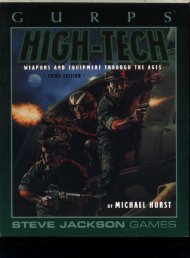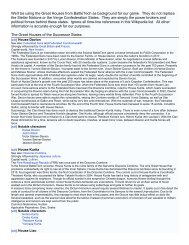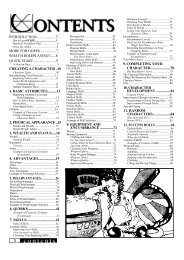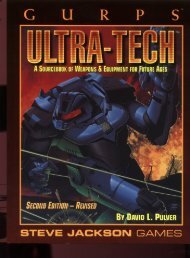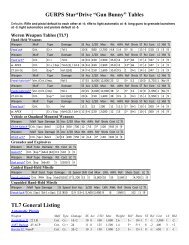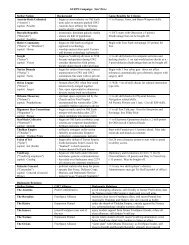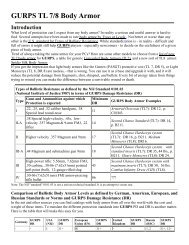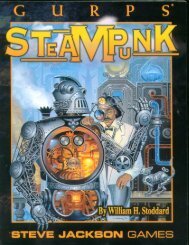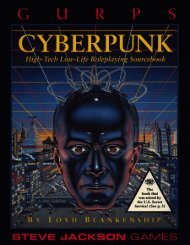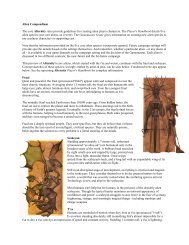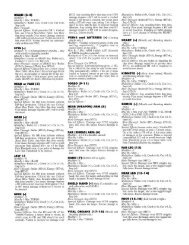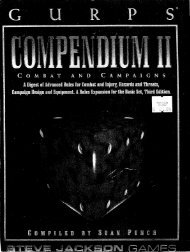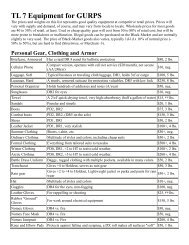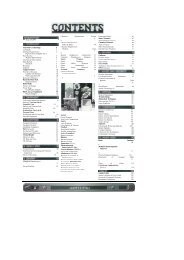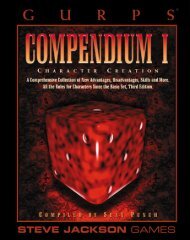Create successful ePaper yourself
Turn your PDF publications into a flip-book with our unique Google optimized e-Paper software.
<strong>Magic</strong>al Terms<br />
abort: To stop the casting of a spell before its<br />
completion.<br />
backfire: A critical miss when a spell is cast.<br />
Same as “fumble.”<br />
base skill: The level of spell skill given by<br />
spending one point (the minimum) for an<br />
ordinary (Mental/Hard) spell, or two points<br />
for a M/VH spell.<br />
basic spell: A spell with no other spells as<br />
prerequisites.<br />
blocking spell: A spell which can be cast as an<br />
instant defense - i.e., a block to some sort of<br />
attack.<br />
cancel: To end your own spell before it would<br />
normally be over.<br />
caster: The person casting a spell.<br />
effective skill: Your true skill, plus or minus<br />
any bonuses or penalties (usually penalties)<br />
you have for range, circumstances, etc. A<br />
caster rolls against effective skill.<br />
energy: The “cost” to cast a spell. Energy cost<br />
may be paid in either ST points (fatigue) or<br />
HT points (hits). Lost energy of either kind<br />
is recovered as usual: resting for fatigue,<br />
healing for hits.<br />
grimoire: A book of spells. Specifically. the<br />
list of spells available to a particular<br />
character, and their cost.<br />
mage: Anyone with the advantage of <strong>Magic</strong>al<br />
Aptitude.<br />
magery or magical aptitude: Two words for<br />
the same thing. Magery is the advantage of<br />
being “in tune” with the powers of magic;<br />
see p. 103/B21.<br />
maintain: To continue a spell after it would<br />
normally end. Costs more energy, unless the<br />
caster has high skill.<br />
mana: The energy of magic. Different areas (or<br />
worlds) have different levels of mana. See<br />
sidebar, p. 6/B147. Different types of mana<br />
are possible as well - see p. 94.<br />
mastered spell: A spell that is known at a high<br />
enough skill to eliminate the need to<br />
concentrate to cast it.<br />
missile spell: A spell which is first cast, and<br />
then “thrown” at the subject. Requires two<br />
rolls: a skill roll to cast, a DX or Spell<br />
Throwing roll to hit.<br />
prerequisite: A requirement for learning a<br />
spell.<br />
resisted: Any spell that must overcome the<br />
“power of its subject before it works.<br />
subject: The person, place. or thing on which a<br />
spell is cast.<br />
wizard: Any user of magic, whether he is a<br />
mage or not.<br />
MAGIC is a powerful and fickle force, controlled through procedures<br />
called spells. <strong>Magic</strong> draws upon an energy called mana - but, though<br />
we have a name for it, we do not know what it is. Even the most<br />
powerful wizards do not fully understand magic... or, if they do, they haven’t told<br />
us about it.<br />
There are hundreds of different magic spells, each with a different purpose.<br />
Skilled wizards can modify old spells or even invent new ones... but<br />
experimental magic is dangerous, and not for the beginner.<br />
Certain people have an inborn ability to learn and use magic. This advantage<br />
is called <strong>Magic</strong>al Aptitude (see p. 103/B21). Anyone with any degree of <strong>Magic</strong>al<br />
Aptitude is called a mage. In many game worlds, only mages can use magic. In<br />
all game worlds, they are better with magic than are non-mages.<br />
Some religions teach that magic is inherently evil, and that any magic-user is<br />
endangering his immortal soul. Certainly, badly-cast spells seem to attract the<br />
attention of something powerful and malicious - and occasionally a clumsy<br />
spellcaster is devoured by a genuine demon!<br />
But it is also true that many good men know and use magic - and the<br />
saintliest of these seem to be immune to the worst magical “fumbles.”<br />
No one really knows. The consensus is that magic, of itself, is neither good<br />
nor evil. It is the way a spell is used - the intent behind it - that determines<br />
whether magic is “white” or “black.” But there is no doubt that certain forms of<br />
magic - human sacrifices, for example - are inherently evil and are despised by<br />
all honest mages.<br />
Learning <strong>Magic</strong><br />
Most spells can be learned by anyone (though remember: in some worlds<br />
they can only be used by mages). Some spells can only be learned by mages<br />
being a mage is a prerequisite for the spell.<br />
Each magic spell is considered a skill, and is learned the same way that any<br />
other skill is learned. But, as the saying goes, “one spell doth not a wizard make.”<br />
Many rogues and adventurers can command a few useful spells, but a true wizard<br />
will be the master of dozens.<br />
Spells have no default level; you must be trained in a spell to use it. Spells<br />
are Mental/Hard skills (except for a few, specified in the Spell List, which are<br />
Mental/Very Hard). However, your level of <strong>Magic</strong>al Aptitude adds to your IQ for<br />
the purpose of learning spells. Thus, if you have an IQ of 12 and 3 levels of<br />
<strong>Magic</strong>al Aptitude, you learn spells as though you had an IQ of 15. No one may<br />
have a <strong>Magic</strong>al Aptitude of more than 3.<br />
Important note: To learn a spell, you must put a minimum of one point in it -<br />
even if you are brilliant and blessed with magical aptitude. Any less study, and<br />
the spell simply doesn’t “take.” Also, note that Eidetic Memory is not too useful<br />
for spells; it gives you rote memory, but not true understanding. First-level<br />
Eidetic Memory gives a +1 to IQ for learning spells; second-level gives a +2. It<br />
gives no other bonuses.<br />
PRINCIPLES OF MAGIC<br />
- 4 -



